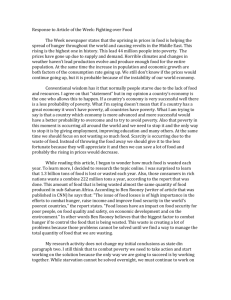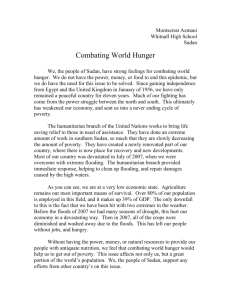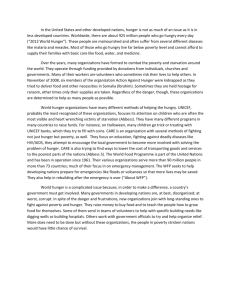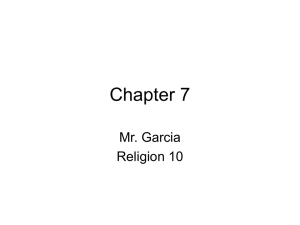Poverty and Hunger
advertisement
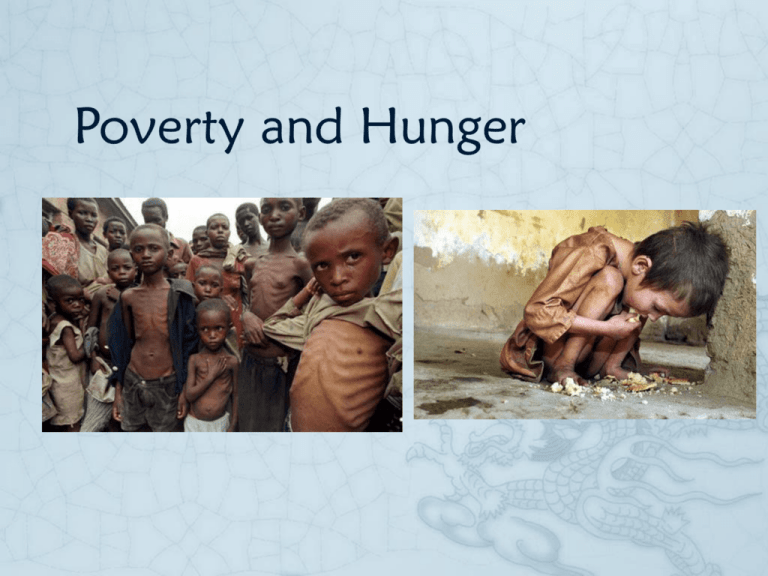
Poverty and Hunger Who? This is a global issues. But the worst part is about women and children. Women and Children ● 60 percent of the world’s hungry are women. ● 50 percent of pregnant women in developing countries lack proper maternal care, resulting in 240,000 maternal deaths annually from childbirth. ● 1 out of 6 infants are born with a low birth weight in developing countries. ● Poor nutrition causes nearly half (45%) of deaths in children under five – 3.1 million children each year. That is 8,500 children per day. ● A third of all childhood death in subSaharan Africa is caused by hunger. ● 66 million primary schoolage children attend classes hungry across the developing world, with 23 million in Africa alone. ● Every 10 seconds, a child dies from hungerrelated diseases. When There have no exact time . The vast majority of hungry people live in developing regions, which saw a 42 percent reduction in the prevalence of undernourished people between 1990–92 and 2012–14. Despite this progress, about one in eight people, or 13.5 percent of the overall population, remain chronically undernourished in these regions, down from 23.4 percent in 1990–92. As the most populous region in the world, Asia is home to two out of three of the world’s undernourished people. Where Where is hunger the worst? Asia: 525.6 million SubSaharan Africa: 214 million Latin America and the Caribbean: 37 million Aiming at the very heart of hunger, The Hunger Project is currently committed to work in Bangladesh,Benin,Burkina Faso,Ethiopia,India,Ghana,Malawi,Mexico, Mozambique,Peru,Senegaland Uganda Why Harmful economic systems.Hunger Notes believes that a principal underlying cause of poverty and hunger is the ordinary operation of the economic and political systems in the world. Essentially control over resources and income is based on military, political, and economic power that typically ends up in the hands of a minority, who live well, while those at the bottom barely survive, if they do. We have described the operation of this system in more detail in our special section on Harmful economic systems The impact of poverty and hunger poverty is a major cause of social tensions and threatens to divide a nation because of the issue of inequalities, in particular income inequality. In a society, poverty is a very dangerous factor that can destabilize and entire country. in all of the countries concerned, the revolts started because of the lack of jobs and high poverty levels. This has led to most governments being overthrown). Crippling accidents as a result of unsafe work environments— consider the recent building collapse in Bangladesh. Poor housing—a long-lasting cause of diseases. Water and food related diseases that occur simply because the poor cannot afford “safe” foods. Children from poor backgrounds lag behind at all stages of education. Global level hunger: 805 million people – or one in nine people in the world – do not have enough to eat. 98% of the world’s undernourished people live in developing countries. Poverty 1.4 billion people in developing countries live on $1.25 a day or less. Rural areas account for three out of every four people living on less than $1.25 a day. 22,000 children die each day due to conditions of poverty. Rural Hunger Project partners have access to income-generating workshops, empowering their self-reliance. Our Microfinance Program in Africa provides access to credit, adequate training and instilling in our partners the importance of saving. Current trends We are living through a period of rapid global poverty reduction. According to recent estimates, high, sustained growth across most of the developing world has helped nearly half a billion people escape $1.25-a-day poverty between 2005 and 2010. Never before have so many people been lifted out of poverty over such a brief period. Solusions 1. Employment generation 2. Drawing on various social institutions to fund poverty fighting programs e.g. charities, research institutions, U.N. , non-profit organizations, universities. 3. Transparency in government spending 4. Cancelling impossible to repay world debts 5. Prioritizing programs that target fundamental human rights 6. Taxing the rich more and the poor less 7. Building self-sufficient economies 8. Education 9. Involvement of the media 10. Microfinancing Hunger is an effect of poverty and poverty is largely a political issue.So solving World poverty means solving world hunger.


